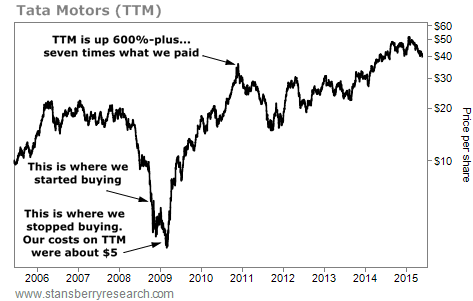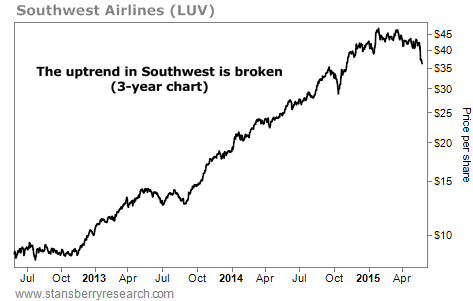| Home | About Us | Resources | Archive | Free Reports | Market Window |
|
Editor's note: Today, we introduce you to the newest member of the Stansberry Research family, Paul Mampilly. Paul is a master speculator with 25 years of experience as a Wall Street analyst and hedge-fund manager. In the essay below, he shares a secret that led to some of the most successful calls of his career...
Why I'm Secretly Hoping for a Crisis... and You Should, TooBy
Wednesday, May 27, 2015
Successful traders and investors should be able to make money in any kind of market... in stocks, commodities, currencies, and bonds.
But there's one type of market where the "professional speculator" truly cleans up... where he can double, triple, or quadruple his wealth in a short period of time.
The gains you can make in these markets will change your life. They will be the most important opportunities of your career.
You don't see this type of market very often... but it's the "Super Bowl" for traders. And I'd like you to be on the lookout for them with me.
The type of market?
It's a market in crisis...
In August 2008, my asset-management firm was selected for a portfolio competition. Only the best asset managers were considered, and my firm had one of the best five-year track records in the industry. We were granted $50 million to manage for one year. And we got to keep a big chunk of the profits that we generated. If we won, we'd also get another $50 million to manage... or a chance to make more money on an even bigger pool of money.
The money for the competition came from the John Templeton Foundation.
Templeton was one of the greatest investors of all time. He famously bought every NYSE-listed stock under $1 (104 of them) after the Great Depression in 1939. These stocks soared when the U.S. joined the Allies in World War II. Templeton went on to make huge fortunes betting on Japanese stocks in the 1960s. And he told everyone to get out of U.S. stocks in 1999, just before they crashed. So getting money from the Templeton Foundation is an incredible mark of achievement in the money-management world.
But in September 2008, we experienced the greatest financial crisis since the Great Depression. People were taking money from their banks and stuffing it into their mattresses. Many others were planning for the end of the world. Newspapers reported people moving to the mountains and stocking up on guns, ammo, rice, beans, seed, and fertilizer.
The stock market was crashing. People were abandoning their homes. Unemployment was soaring. The U.S. economy tanked. It created a global crisis. There were riots in China. In the United Kingdom, people stood in lines to get money out of banks. Around the world, people believed that the next Great Depression was happening. It was a dark time.
As one of the most senior portfolio managers, I was selected to manage the $50 million Templeton account. I was facing the most difficult decisions of my professional life.
Before I tell you what happened, you must understand one thing: Making money in the financial markets is never easy. And not for the reason(s) you might think. It's hard because when it comes time to take action, most people are too afraid to do it. We worry that the stocks we've selected are going to keep going down. We worry about looking foolish among our peers or friends and family. And if, like me, you do it for a living, you worry about losing your job if you do the wrong thing.
Successful speculators have to be willing to act at the right time. So many people let their emotions get in the way of making the right decision. They feel an irrational fear. I've felt that fear many times myself. But I no longer let it cloud my judgment. I understand that the critical factor in making a trade is psychology. And from more than 20 years of experience, I know that the best trades come when there is fear everywhere. Knowing when most other people are fearful is actually a positive thing... It's often a "buy" signal.
The psychological aspect of speculating prevents most people from doing it well. It's hard to be unemotional about risking money. But...
The best opportunities come when most people don't want to buy. The best opportunities come when financial newspapers and websites are filled with doom and gloom. Everyone is scared. Your friends and family and coworkers will tell you that buying this stock or the other is crazy.
That was the situation I faced in 2008 with the Templeton account. When I told someone from the Templeton Foundation that I was going to start buying stocks in September 2008, he asked, "Are you sure?"
That's what you should expect to get every time there is a great opportunity to make big money. You'll get doubt, fear, or – worse – scorn when it's time to buy.
I'm not telling you that you shouldn't be a little scared when those times come. That's normal. Just don't let fear prevent you from acting.
You can't be like everyone else if you want to make big money speculating. No matter how great the upside potential, almost no one wants to buy when things are really, really cheap... when you should get in and buy with both hands.
You'll need patience, because things can go down before they start going your way. But when they do, you can make 500% or 1,000%... sometimes in a few months or less.
The financial crisis of 2008 felt like something I'd been training for my whole life. In September 2008, I started buying stocks for the Templeton portfolio. The account had unusual requirements. It could only hold 10 stocks, and no more than 20% of the account could be in any single industry. In other words, the restrictions forced you to make concentrated, focused, and high-conviction bets.
I gave instructions to our traders to buy the 10 stocks I selected. Every day we bought a little bit. The goal was to use up 5% of the cash each week and use up all the cash in about three months.
Here's what was going on while we were doing this...
On September 15, 2008, Lehman Brothers declared bankruptcy. The stock market, already down about 20% for the year, plummeted again. By November, it was down a total of 50% for the year.
If you're not a professional investor, buying as the financial world is crashing sounds crazy. But it made perfect sense to me. More on that in a minute...
By early January, we were finished buying. And the next three months were the longest of my life. After forming a bottom on November 20, 2008, the stock market surged higher by 15%. The stocks that I had selected in the Templeton account started to go up. But this stock market surge was temporary. A false dawn.
On January 6, 2009, the market crashed again, dropping nearly 20%. And on March 9, 2009, it bottomed for real. It was a terrible period. Some days I didn't sleep... I watched the U.S. markets all day, the Asian markets at night, and the European markets in the early morning.
But when the dust settled, I'd made the right calls...
By the end of 2009, the Templeton account was up a huge 76%. The portfolio held a mix of global infrastructure stocks and companies that would recover with the economy and improved investor sentiment.
One of the stocks that I bought in this account was Tata Motors (TTM), the largest automotive manufacturer in India. It owned huge global brands like Range Rover and Jaguar. When the crisis hit, its stock market value plummeted as if it were going bankrupt. But Tata's financial statements showed otherwise. And it had long been one of the best companies in India.
As you can see in the chart below, we started buying Tata in September 2008 and kept at it until January 2009. Our average cost for the stock was about $5. By the end of 2009, Tata was trading for about $16. We'd made more than 220% in less than a year. By November 2010, Tata stock was trading at $36... a 520% gain in less than two years.
 All I had to do was wait for the market to realize what I already knew about Tata.
The global crisis of 2008 created incredible bargains on companies like Tata... and a huge opportunity to make unbelievable profits. All 10 of my Templeton stocks went up, but Tata was critical to the results. Some of the Templeton asset managers chose to stay safely in cash and ride out the crisis. But I saw an opportunity... and my firm won the competition.
I didn't tell you this story to boast, but to show you the kind of gains you can make speculating in a market crisis.
Regards,
Paul Mampilly
Further Reading:
Yesterday, Steve shared why he doesn't think a crisis will hit U.S. stocks any time soon. "It's fair to call this current stock market boom FAT and OLD at this point," he writes. "Typically, those aren't good things – but they don't mean the boom will end soon." Find out why here.
Dr. David Eifrig also told readers about a common investment they should sell immediately. "Many investors are making a big mistake with the way they hold bonds today – simply because they don't know any better," he writes. Get the full story here.
Market NotesTHIS "BOOM & BUST" SECTOR IS BREAKING DOWN After nearly four years of huge gains, the uptrend in airline stocks has been broken.
Back in September 2011, we wrote a bullish note on airline stocks. Airlines sport razor-thin profit margins, they're subjected to wild swings in fuel costs, and they require lots of capital expenditures to keep the business running. This makes them horrible long-term investments. But from a trading viewpoint, it's worth noting that airlines go through big "boom and bust" cycles. These cycles can be traded for big profits.
Just after our note, airlines stocks entered a huge, multiyear rally. Take major flight-operator Southwest Airlines (LUV), for instance. As you can see in the three-year chart below, shares soared nearly 500% in less than three years.
But since reaching an all-time high in January, shares are down 24%... and the trend of higher highs and higher lows has been broken. Traders be advised... After a four-year boom, airline stocks may be back in "bust" mode.
 |
Recent Articles
|



